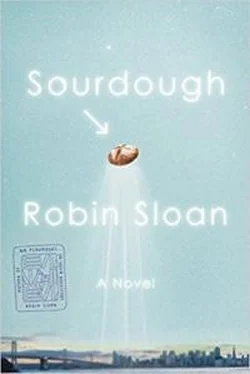The end of the corridor was in sight; across the concourse, a grow room glowed pink.
“Is he succeeding?” I asked.
“It is no small thing to change a culture,” Horace said simply. “But I think interesting things are growing here. Lucrative enterprises. Provocative tastes. Perhaps, even, if you can imagine it”—he pranced into the light—“this book of mine.”
Out in the concourse, among the shelves I now understood were only the tip of a vast project, Horace hunted and reached and produced a grip of books.
“Here,” he said. “This is your education.”
The stack contained The Candide Cookbook and The Next Candide Cookbook , both with plain black covers, along with California Table: The Café Candide Story , large and glossy, and finally a floppy paperback titled Tend Your Garden: Charlotte Clingstone and the Making of a Perfect Place .
That last volume showed on its cover a woman, broad-faced and serene, standing in a garden wearing very comfortable pants. A sense of recognition circled the runway, came in to land: I knew Charlotte Clingstone after all. She had been part of the panel at the Ferry Building. She was the central deity. That will be all. I had no doubt: she was the one who’d said no.
IN YOUR MESSAGE, you told me about your family, how you don’t have any traditions. The first time I read that, it made me sad, but then I thought about it for a while and I started to feel jealous. Lois, think about it! No one cares if your restaurant has tables. You can build robots, or bake bread, or do something else entirely. You’re unencumbered by culture. You’re … light!
We’ve arrived in Berlin. This apartment is bigger than the last one, but it’s really dark. Shehrieh says it’s fine. I still haven’t told her about my restaurant.
Chaiman wants me to tell you he misses your city by the bay. As for me, I miss your voice on the phone.
THE LOIS CLUB (CONTINUED)
I’D SKIPPED A MEETING of the Lois Club, not because I consciously decided not to go, but because I’d been so busy it had escaped me completely. I sent an apology to Hilltop Lois a week late and promised I had not forsaken them. We missed your bread!!!! she replied. She seemed to use more exclamation marks every time.
When I entered, bearing six loaves of bread—one to eat, the rest to distribute as gifts—the Loises all fell silent. I’d expected a hero’s welcome; instead, they looked at me strangely.
“What?”
“It’s just—you look so different,” Professor Lois said.
“You look wonderful!” Compaq Lois said.
“Do I really look that different? What do you mean?”
“You just—” Professor Lois searched for words. “You’re in great shape. Have you been doing yoga?”
“You’re making us feel bad!” Old Lois cackled. “Here we are, all the same as ever. Of course, for some of us, that’s an achievement…”
To fill the silence, I started to unspool the story of the last month. They didn’t know about the Marrow Fair. I told them everything.
“Can I shop there?” Compaq Lois asked. “It sounds fabulous.”
I explained that it ran previews early on Wednesday mornings, but by invitation only, and that it would be opening to everyone soon.
“And you’re going to Café Candide?” Professor Lois asked. “How wonderful. My husband and I went there years ago. Our twentieth wedding anniversary.”
“Hope you saved your pennies,” Old Lois said. “I hear it’s pricey.”
“I’m not going to eat,” I said. “Just to investigate.”
“I saw her speak at the Commonwealth Club,” Professor Lois said. “Charlotte Clingstone. Very impressive woman.”
“I saw her in a documentary on KQED,” Hilltop Lois interjected.
“I met her at a fund-raiser,” Compaq Lois said. “For the turkey vultures.”
They had started and it seemed they couldn’t stop. Their fascination surprised me; but as they spoke—
“She spent three years in France, you know.”
—I realized—
“Yes, she met her husband there.”
—Charlotte Clingstone presented a kind of ideal. She was bohemian but accomplished. Worldly but rooted.
“Her first husband. Now she’s married to a poet.”
Who wouldn’t want that life?
“Oh, yes. I have his book. He dedicated it to her.”
“That was his first one. The second, he dedicated to her plums.”
“Her plums!”
“No, he really meant it. In the back, in the garden behind the restaurant, I guess there’s this amazing plum tree…”
“Her plums ,” Old Lois crowed.
“I’ll see if I can spot the tree tomorrow,” I said.
“Yes,” Old Lois said between snorts. She couldn’t stop laughing. “Watch for those plums!”
THE HUB, THE HEART
SAN FRANCISCO IS SHORT ON GREENERY and the streets have a bare brightness. Berkeley runs wilder. Walking from the North Berkeley BART station to Café Candide, I had to circle around huge hedges that surged and blocked the sidewalk. There were no lawns. Instead, residents cultivated behemoth planter boxes; personal citrus groves; gardens of meaty succulents that seemed to glow with an inner light. The streets were quiet, but I sensed eyes through gauzy curtains. A fat squirrel shadowed me for a block.
In one place, a massive willow tree’s roots had split the pavement. Its leaves brushed my head.
I pulled out my phone to double-check the restaurant’s address, but I didn’t have to search for it: Café Candide was preemptively inscribed on the map, like a government office or a natural landmark.
When I emerged into the quiet shopping district I saw the rim of the hills looming above, a dark cutout now turning pink in the evening light, the steep wooded slope crusted with houses whose windows flashed white in the sun.
I found the restaurant smashed between a hardware store and a mobile phone outlet peddling a brand I didn’t recognize. Both store and outlet looked like they belonged on this block; Café Candide, not so much. That impression was wrong, of course. Café Candide had stood here for decades while businesses flashed through the storefronts on both sides.
It was a house of darkest gingerbread, odd-angled and enormous, seeming to lean slightly on its neighbors. Yes, Berkeley Nuts-n-Bolts and Air Zero were definitely providing significant structural support to the old restaurant. Café Candide’s roof was densely shingled and sharply slanted. A short chimney tossed up a ragged streamer of smoke.
It was very clearly a witch’s abode.
The house/restaurant was set back from the sidewalk, guarded by a stubby fence of wrought iron, the gate currently open. My heels thwapped across a patio paved in slate. The door was a slab of dark wood with an iron handle that matched the fence. The wood was carved with a mazelike pattern; I wanted to plunk my finger down and find my way through it. The maze’s channels shone smooth and glossy, so maybe I wasn’t the first person to feel that impulse.
There was no sign that said CAFÉ CANDIDE. There was also no doubt that this was the place.
I knocked, or tried. My best effort produced barely any sound; it was like knocking on a mattress. So I took the door by its handle, hauled it open a crack, and before it could close again, I slithered through.
Inside, a young woman in a linen smock was pushing a mop across gleaming floorboards. The soap smelled dense and spicy.
“Excuse me,” I said. Her eyes snapped up. “I’m here to see Charlotte Clingstone. I called this morning.”
The smocked mopper nodded and beckoned for me to follow.
She glided through the cool, dark dining room. The tables and chairs matched the paneling on the walls and the boards beneath my feet; the room could have been carved from one great block of wood. Everything was soft and smooth, polished by use. I saw myself reflected in the floor. A warm shadow.
Читать дальше










